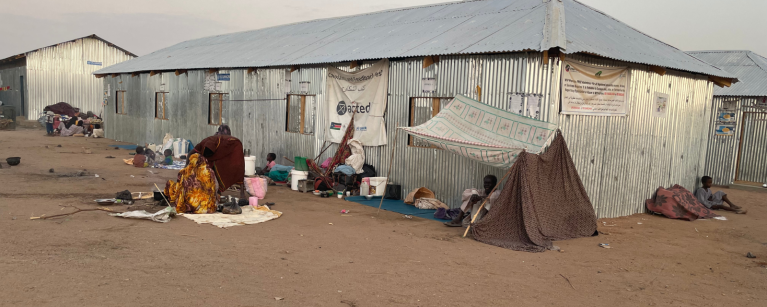When the fighting erupted in Sudan’s capital Khartoum, 26-year-old Aisha was home with her two children. Gunshot sounds were getting closer to her home and she knew that they had to run for their survival.
“My husband and I took our two children and escaped, there was no time for anything else,” says Aisha. However, while escaping, Aisha was caught up in the crossfire and was shot in the hip . “I was in pain, I fell and my husband had to carry me as we escaped. Luckily, we got a minivan that was transporting people fleeing and after a week on the road, we got here in Renk”
With a bullet still logged in her hip, Aisha says the journey was difficult due to her condition and did not think she would survive the road. “When we finally got to Jodah, the doctor from one of the NGO’s examined me and just gave me some pain medication that is now finished,” she explained.
On arrival to South Sudan border in Jodah, Aisha, her husband, and two children were transported to Renk, a town at the border of Sudan and South Sudan. Her family have not been allocated a home and they are staying out in the open with her makeshift home consisting of clothes strung on sticks, providing minimal shelter from the heat and some semblance of privacy has they wait for registration and possible allocation depending on availability.
“We have stayed in the open since we came, the centers are full with many people sharing small spaces” she said adding “we just spend our day and sleep here” as she points to her makeshift home. Aisha’s husband approches all aid organisations staff to ask for help on behalf of his wife whose pain has been aggravated by an extended lack of medical attention.
With the arrival of over 1,500 people every day, the two transit centers in Renk are at full capacity, hosting people four times their size. The centers which was meant to be just a registration centre was initially designed to host only 4,750 people but is now home to over 15,000 people with hundreds of thousands of others living out in the open.
The services here are extremely limited and humanitarian agencies are racing to scale up emergency assistance but the needs are fast outweighing the needs needed by the over 600,000 people who have arrived.
For many Muslim refugees escaping the war in Sudan, this has been by far their hardest Ramadan due to uncertainty about where their next meal will be coming from. 35-yearold Nafisa Ismail Adan, a Sudan refugee arrived in Renk last year October after losing her husband to the conflict. Like Aisha, Nafisa now lives with her seven children in a tent strung together by worn-out clothes.
When she arrived, Nafisa got a job to fetch water for people, walking nearly seven kilometres one way to get to the nearest water point. “It takes me over two hoursjust to access the closest water point and I do this more than once, so I can get paid and buy food for my children,” explains Nafisa.
Having left everything behind, she says life has not been easy in South Sudan. “ We had a home, a job and even school for my children back in Sudan, but here even water costs $3 which I can’t afford,” she says, adding that although they get some support from aid agencies it, is not enough.
Nafisa and Aisha together with their families are among more than 600,000 people who have fled to neighbouring South Sudan since fighting between rival military factions that engulfed large parts of Sudan.
But this new emergency is straining an already stretched and underfunded response in South Sudan that is still reeling from the devastation of a brutal seven-year civil war that ended in 2020.
Over 2.2 millionSouth Sudanese remain internally displaced due to the conflict and the impacts of climate change, while three-quarters of the population needs aid.
Oxfam, together with partners are providing clean water and proper sanitation to over 90,000 people in the transit camps but urgently needs $7 million to ramp up its operations and reach 400,000 people with lifesaving food, clean water, and sanitation.
